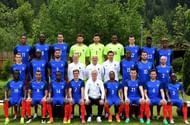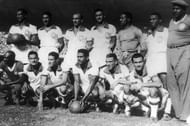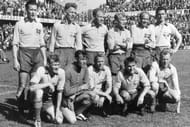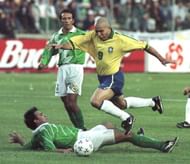Portugal’s memorable victory in the final of Euro 2016, last night, meant France had the unenviable statistic of having lost a final on home turf to shoulder. While France had bedazzled the world with their attacking displays, combining silky smooth passing with eyeball grabbing moves on and off the ball, Portugal had been eking out results the hard way.
However, it was the Portuguese on the night, who went that extra mile to etch their name in the annals of history. Cristiano Ronaldo, having already firmed up his place in the hallowed corridors of football’s hall of fame, made sure he added an elusive feather to his cap. One bearing the sheen of the gold that straddles his neck as a medal, as he returns to Portugal after success on the international stage.
While France had been all conquering on home turf since 1984, when led by Michel Platini, France lifted their first European Championship, 2016 marked an end to that run. Here we take a look at 5 teams, including the French of 2016, who fell at the final hurdle on home turf.
1) Portugal Euro 2004
The 2004 European Championships marked the return of the romance between the Euros and the underdogs. When Denmark of 1992 had become an almost distant dream, Greece popped out of nowhere to beat Portugal, the hosts, in the final and lift the trophy. Euro 2004 saw Portugal field their strongest side in recent times and the hosts were favourites for a reason. With Porto’s resurgence on the European stage, Portugal developed a fine crop of players like Deco and Ricardo Carvalho, who were aiming big on the world stage.
Along with the younger stars, the likes of Luis Figo and Rui Costa, established names in world football back then, were there to add a touch of class and be the much important guiding lights thanks to their experience.
Another young upstart, Cristiano Ronaldo, was just beginning to make waves in English football, and the whole world was excited to see the hot prospect shine on the international stage. However the underdogs prevailed on that fateful night, and Greece, led by Angelos Charisteas and co. ensured the night which promised so much, ended in tears for Ronaldo and his teammates.
2) France Euro 2016
For France, Euro 2016 seemed to be a bit too long a tournament, for their liking. Probably having peaked far too early, they looked a tad tired and overwhelmed by the occasion in Paris, during the final. Qualifying with ease from a relatively easy group, the hosts were taken by surprise by the Republic of Ireland in the round of 16, with the Irish punching far above their weight.
It took 2 strikes from eventual top scorer Antoine Griezmann to tilt the scales in France’s favour and secure progression to the quarters. France were in imperious form against minnows Iceland in the quarters, and romped home 5-2. A mouth-watering semi-final clash against reigning World Champions Germany ensued, and a dramatic smash and grab performance saw Germany hog all the possession over 90 minutes and yet France emerged 2-0 winners.
The stage was set for the French to emulate the heroics of 1984 and 2000, once again in front of their own fans. Like Zidane and Platini before, Antoine Griezmann seemed to be the talisman who would lead them to glory. However, the script was not written according to plan, and despite losing Cristiano Ronaldo, Portugal emerged champions after extra time, courtesy a fantastic strike from Eder.
3) Brazil World Cup 1950
The first World Cup in the post-World War II era was hosted in Brazil in 1950. Uruguay triumphed over Brazil in what was to be a decisive encounter in the final group, with the finals being played as a league between 4 teams rather than as a one-off affair. This was also the inception of the Jules Rimet trophy, with the World Cup being renamed after Fifa’s ex-president.
This World Cup was marked by a number of controversies, with Germany, both partitioned and occupied, and Japan not being allowed to take part in qualification. However, Italy and other allies of Germany in World War II were allowed to participate without any sanctions. Italy’s team had been severely depleted by the Superga air disaster of 1949 as a result of which the defending champions had to field a weakened team.
In the final round, Uruguay, Brazil, Sweden and Spain competed for the top prize. Despite winning 7-1 against Sweden and 6-1 against Spain, Brazil lost against Uruguay by 2 goals to 1. That victory meant Uruguay topped the table with 2 wins and a draw against Spain, and consigned hosts Brazil to the runners-up spot.
4) Sweden World Cup 1958
Looking at Sweden during Euro 2016, one must wonder whether a team of Zlatan Ibrahimovic and 10 clones of his would have fared better than the very average unit that was on display during the tournament. However back in their heyday during the 1950s Sweden were a force to be reckoned with on the international stage, as one of Europe’s premier teams.
Forever to be remembered in football folklore as Pele’s first World Cup, the magician from Brazil made his first foray on the international stage, at the 1958 World Cup. Brazil emerged winners after beating hosts Sweden. This world cup also marked the only time when all the nations of the United Kingdom had qualified for the tournament and the tournament also marked the first time goal averages were used to separate teams tied on points.
Sweden took on Brazil in front of a boisterous crowd, whose mood was further enhanced when the home side took the lead. However, an equaliser from Vava and then another goal gave Brazil the lead, 2 goals from Pele and one from Zagallo meant the Swedes ended up well and truly beaten.
5) Bolivia Copa America 1997
South American football, for the average football fan, is consigned to Argentina, Brazil, Chile, and Uruguay and to an extent Colombia and Paraguay for their recent exploits. And yet back in the 1990’s Bolivia were a significant force to be reckoned with.
The hosts of the 38th Copa America, Bolivia were much fancied to leave a mark on the international stage. The hosts eventually fell to Brazil in the finals, who became the first nation to hold both the World Cup and the Copa America trophies simultaneously, a feat they would later emulate in 2004.
Having topped a group containing Peru, Uruguay and Venezuela, Bolivia took out Colombia and Mexico en route to the finals. With the crown looming in sight, only an upset against a formidable Brazilians would see the Bolivians claim their tryst with glory. However it was not to be, despite the vocal support of the home crowd, the Bolivians were truly outclassed in the final, losing by 3 goals to one.




